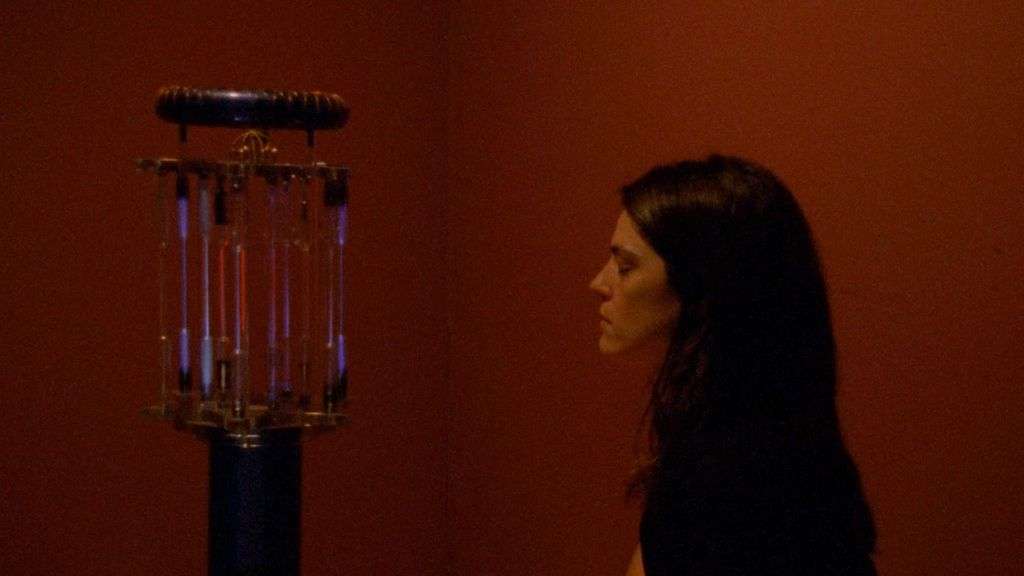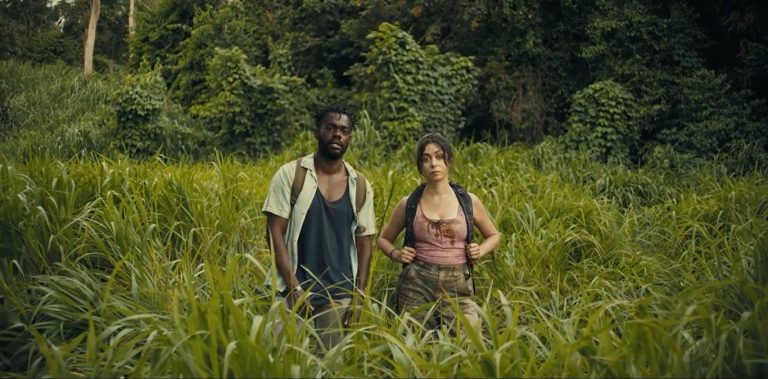Docufiction is a fascinating genre whereby individuals play exaggerated or slightly tweaked versions of themselves, reacting against a realistic world where fictional elements would collide with the perspective being shared within the documentary. It makes for a fun game of jumping between two completely different forms of storytelling, provided the filmmaker chooses to shuttle rather than dive headlong into one singular form, letting the other emerge in flashes. “Invention,” directed by Courtney Stephens and written by Stephens and lead actress Callie Hernandez, follows an apparent documentation of Callie’s learning of her father’s invention of an alternative device of healing and how the interactions between her and the different people involved with her father and this invention shape her idea of the man she finds herself struggling to recognize.
The concept of death or the loss of a loved one, especially one as the cornerstone of identity as a parent, leaves one with a feeling of being tetherless. Death as a significant inevitability, ensuring that the person has ceased to exist, is a concept that becomes hard to reconcile for any individual, more so when the aftermath of the death leads to revelations of their flawed humanity.
I do find it fascinating the push and pull between non-fiction and fiction that the movie does try to pull off with visual and editing flair. The interpolation of scenes like real-life footage of Callie Hernandez’s father as a salesman on TV selling off wares promising alternative outlooks to conventional procedures or the static shot of a lit candle, with voiceovers of Callie and the director and the actors interacting and talking about Callie’s father, deciding how to move forward with this form of “improvisational filmmaking.”
The meta-narrative slowly and intricately wrapping itself around a mostly simple narrative is fun and almost playful. Still, amidst all this rigor, one question would be logically at the forefront: the reason for this movie’s existence. And that reasoning becomes abundantly clear, transcending what could essentially be interpreted as a throwaway line of dialogue in a press tour to being the central text over which this film is operating.
More than the overall film as a consequence, the act of filmmaking—the traversing through the documents or the secrets being spilled out to lawyers or the knowledge of not being granted a discount by a flight service because a person doesn’t qualify for the number of bereavement days allotted by the airline—by the integration of all these idiosyncratic moments, “Invention” becomes more than simply a movie balancing itself on two different genres. In a way, it transforms into a form of exorcism, demonstrating that bereavement and the grieving process are not confined to a specific timeline, and constricting them to such arbitration is unhealthy.

The steps being taken to process grief rest primarily on acknowledgment. And Hernandez’s performance of deadpan acknowledgment, hiding the vulnerability that threatens to break through in moments of affection, of listening to bad jokes, of her barely concealed interest to know more about her father through secondary sources, are moments of light, feathery, and yet exquisite performances that truly confuse and challenge the difference between reel and real.
It helps that the grainy cinematography and overall visual aesthetic of the digital Handycam remain consistent throughout. However, it is in delving deep into its ambition of exploring conspiracy theories and how those theories originate out of deep resentment and dissatisfaction over the current system prevalent in the economy and sociological development that the movie falters. It is commendable how, under the garb of an absurdist comedy, Stephens and Hernandez try to explore why conspiracy theories or the urge to search for alternative measures exist and how her father had such fervent following and loyalty. However, it’s in the explanation or moments where the film tries to push slightly towards surrealism that “Invention” stumbles.
As if understanding my engagement is slowly tending towards dissociation, the final act of the film shows Hernandez breaking down, asking whether the machine should be fast-tracked to market. Logic becomes irrelevant when grief is overwhelming, and by that point, perhaps selfishly, Hernandez in the film is trying to reconcile the loss of her father by ensuring that her father’s wishes come true, irrespective of feasibility. If nothing else, that is the most human experience of them all, and that’s how the movie reeled me in with that gut punch. Stevens’ “Invention” is intensely personal yet universally relatable amidst its idiosyncrasies.








![Lion [2016] – A Melodrama with Considerable Stretches of Admirable Nuance](https://79468c92.delivery.rocketcdn.me/wp-content/uploads/2017/02/lion-cover-768x512.jpg)
![The Sadness [2021]: ‘Locarno’ Review – An Interesting Gore Fest that Never Takes Off](https://79468c92.delivery.rocketcdn.me/wp-content/uploads/2021/08/the-sadness-2021-locarno-768x512.jpeg)